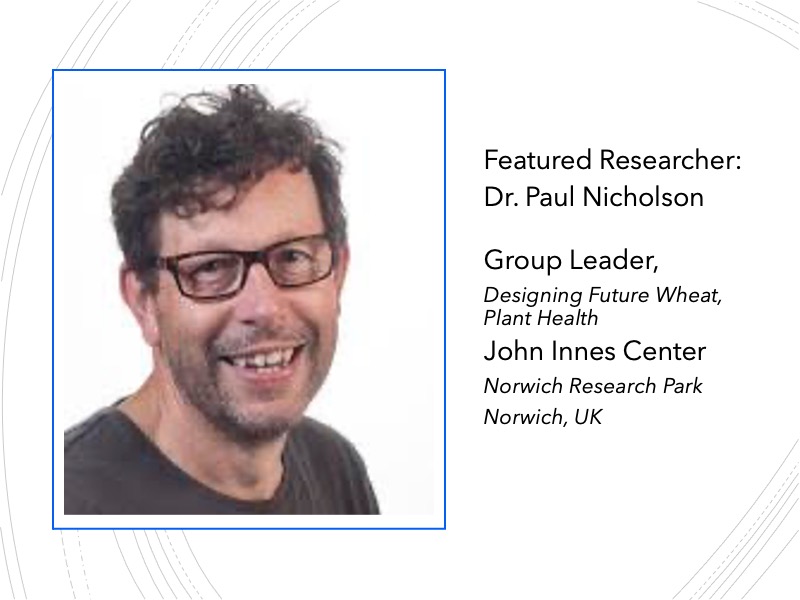Featured Researcher Bio - Paul Nicholson November 2021

Meet Paul Nicholson, Ph.D., a group leader for designing future wheat and plant health at the John Innes Center located in Norwich, UK. Dr. Nicholson was the first member of his family to attend University. He studied biology at the University of East Anglia (UEA) in Norwich. Following graduation, Nicholson found himself working as a research technician at Cambridge University under the direction of Dr. Richard Michelmore, current Director of the Genome Center at UC Davis. While working for Michelmore, Nicholson was offered the opportunity to obtain his Ph.D. in the Botany Department at Cambridge. After three years of studying the ‘Basal rot of Narcissus’ he took a postdoctoral position in the Department of Biochemistry focused on algae and cyanobacteria abiotic stress responses. Later he joined the non-privatized remnants of the Plant Breeding Institute as it transitioned from Cambridge to Norwich to become part of the John Innes Center.
Transitioning to FHB Research
At the time Nicholson was tasked with researching eyespot (strawbreaker footrot). During this research he worked to differentiate the causal agents into two species. Additionally, he worked to develop new techniques to allow him to identify and quantify fungal components of cereal stem based diseases, including Fusarium spp. Nicholson doesn’t contribute any one experience to inspiring his work with Fusarium head blight. In truth, he wanted to change research objectives, moving away from eyespot, and at the time FHB was not being actively studied in the UK.
Adding Pieces to the FHB Puzzle
When asked what his biggest accomplishment related to FHB research is, Nicholson is quite humble. “I cannot claim to have made any truly ‘big’ accomplishments related to FHB.” He believes his greatest contribution lies in the science and information his group has contributed to the FHB community. “I hope that we have added a few pieces into the FHB puzzle.”
His favorite thing about his job, being paid to do something he is passionate about. “To be paid to do research is a huge privilege. I am deeply conscious that I am using tax-payers money to indulge in asking the questions that I believe are important and/or interesting,” said Nicholson. He believes scientific freedom to be the most wonderful aspect of being a researcher. Another incredible advantage to doing what he loves is traveling to different places and meeting new people all with the same common interest.
Hear Nicholson at the 2021 National Fusarium Head Blight Forum
Dr. Nicholson is one of this year’s 2021 NFHB Forum Plenary Session speakers. He’ll be presenting on “Resisting Susceptibility to FHB,” and plans to share with the community the results of his work on understanding the host resistance aspects of FHB. While much of his work has highlighted the importance of ‘susceptibility’ in FHB, Nicholson will also share examples of this aspect of his research in his presentation..
Visit the John Innes Center website to learn more about Dr. Paul Nicholson and plan on attending the Plenary Session of the 2021 NFHB Forum on Monday, December 6, 2021 at 8 a.m. P.T. | 9 a.m. M.T. | 10 a.m. C.T. | 11 a.m. E.T. The 2021 NFHB Forum will be held virtually. Registration is required to attend the Sessions.
You can also check out the series of previous USWBSI Featured Researchers.
